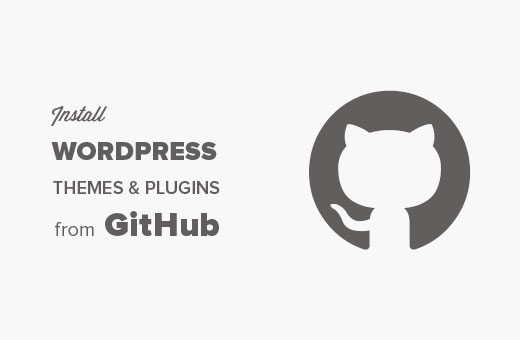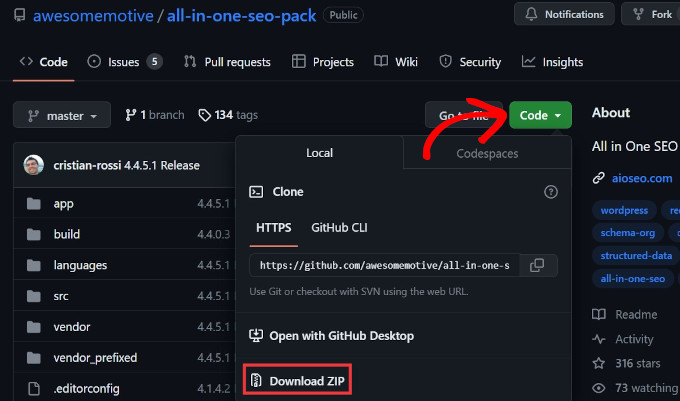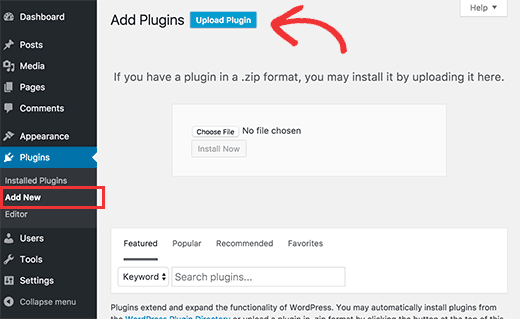Although most users typically install WordPress plugins and themes straight from the WordPress.org repository, there are also plenty of other options on GitHub.
GitHub is a project hosting service used by many open-source projects and developers. As a WordPress user, sometimes you may come across plugins or themes hosted on GitHub.
Since GitHub is not specific to WordPress development, it may be difficult for a new user to figure out how to download and install a plugin or theme from this platform.
We’ve worked with a bunch of different GitHub plugins before, so we know everything that goes into setting them up on your WordPress website and keeping them updated.
And in this article, we will show you how to install WordPress plugins or themes from GitHub.

What Is GitHub?
As we mentioned earlier, GitHub is a code hosting service. It is free to use for open-source projects, and currently, it is the most popular project hosting service among open-source developers.
It uses the Git revision control system, hence the name GitHub. Not only that, but it provides easy tools for collaboration and social networking features, such as following users, giving repositories stars, subscribing to repositories and projects, and more.
GitHub can be used on any project that wants to use the Git revision control features. For example, it can be used for open-source learning resources, documentation projects, manuals, guidebooks, and more. GitHub’s tools allow users to add other users to their projects and work with them in teams.
That being said, let’s look at how to install WordPress plugins and themes from GitHub.
How to Install WordPress Plugins and Themes From GitHub
Before you install a WordPress theme or plugin from GitHub, make sure that you are able to receive updates for it. We will cover that part later in this article.
Installing plugins and themes from GitHub is super easy. It is just like installing a WordPress plugin manually.
First, you need to go to the plugin/theme’s repository on GitHub.
On the main page of the repository, click on the ‘Code’ button and then select ‘Download ZIP’.

Now, head over to your WordPress admin area and go to the Plugins » Add New page.
You will need to manually upload the plugin from your computer. To do that, click on the ‘Upload Plugin’ button.

This will show you the option to upload the plugin’s zip file.
You need to click on the ‘Choose file’ button and then select the ZIP file from your computer.
Next, you need to click on the ‘Install Now’ button. WordPress will now upload the zip archive from your computer to your website, unzip it, and install the plugin for you.
Once it is done, you will see a success message. You can then click on ‘Activate’ to activate the plugin on your WordPress website.
How to Get Updates for WordPress Plugins Installed From GitHub
By default, WordPress looks for a newer version of the plugin based on a plugin’s read me file and plugin header, which contains the information about the latest stable version to use.
However, by default, WordPress does not show automatic updates for plugins downloaded from GitHub. To enable users to automatically receive updates directly from GitHub repositories, theme and plugin developers need to make a little extra effort.
To achieve this, some plugins and themes from GitHub may already have included the code that will enable you to receive automatic updates.
In some cases, the theme/plugin developer may ask you to install the GitHub Updater plugin. This will enable you to get updates for GitHub plugins and themes.
In either case, you will have to contact the plugin/theme developer on GitHub and ask them about the updates situation to be sure that you will get updates when they release a new version.
Bonus: How to Automatically Deploy WordPress Theme Changes Using GitHub
If you are a developer working on a custom theme, it is also possible to automatically deploy your changes to GitHub.
This can save you a lot of time and also ensures that you have different versions of your theme saved in case you need to roll back changes in the future.
For details on how to do this, you can see our guide on how to automatically deploy WordPress theme changes using GitHub and Deploy.
We hope this guide helped you install WordPress plugins or themes from GitHub. You may also want to see our guide on how to code a website and our expert picks for the best code snippets for WordPress.
If you liked this article, then please subscribe to our YouTube Channel for WordPress video tutorials. You can also find us on Twitter and Facebook.





Dennis Muthomi
For me, I always set up a staging environment when testing GitHub plugins. It’s saved me so many headaches! I can check everything works properly before going live. This is especially important with lesser-known GitHub repos.
Your tips about checking updates are spot-on – it’s exactly how I handle my clients’ sites. I’m definitely sharing this with my junior devs who are just getting started with GitHub WordPress stuff.
Jiří Vaněk
GitHub is still a big unknown for me, but I’m slowly trying to delve into its mysteries and commands. I’m mainly interested in it because of the versioning possibilities and also because there are occasionally very interesting projects here. And yes, as a beginner, I still don’t understand it. Tutorials like this are very valuable to me because this is not the first article about GitHub that I’m reading here. The more I learn about it, the more I start to enjoy it, because even in WordPress, one can step out of the box, so to speak. That means going a bit beyond the official WordPress repositories. And because of this, I get access to interesting projects again. Thanks for these guides.
Moinuddin Waheed
This is very good news that the vast community of wordpress non code background can also use GitHub for downloading themes and plugins.
i thought that git and GitHub are only developers per se. But we can use wordpress themes and plugins downloaded from here.
Thanks wpbeginner for this helpful tutorial.
At times we don’t get plugin in wordpress repository and Google shows it in GitHub, so we can easily access and test them on our local machines.
Jiří Vaněk
That’s right. What I’ve also discovered is that you can find solutions to many problems on GitHub. Several times while working with WordPress, I encountered an issue on a foreign website and in my effort to help, I ended up on GitHub. And there, I found the solution. However, sometimes it was a bit more complicated for me to implement it. That’s why these articles are very meaningful and have great potential for me, because I feel that you can find really interesting things on GitHub that aren’t usually in the repository.
Ethan
Hi, are the plugins and themes from github safe to download without malware and other malicious code?
WPBeginner Support
It would depend on who’s code you are downloading
Admin
Ismail
Hello admin,
Thank you so much for this article and I learn a lot from this site. Today, I want to download Facebook Instant Articles fro Github, and this article help me to do that. But I have a question, if possible please guide me since I am newbie.
For FBIA plugin from WP Directory, do I have to uninstall it and install the plugin from Github afterwards? I hope you can help me on this. Thank you for your help to all people.
WPBeginner Support
If you are replacing the plugin with a version from GitHub it would normally be best to remove the old files and then replace them with the plugin from GitHub
Admin
yh
wordpress is saying I need a business plan to add plug ins. is there any way around this? or is there any way for me to retrieve a scheduled post and post it manually? I cant find the post anywhere
WPBeginner Support
Please see our guide on the difference between self hosted WordPress.org vs free WordPress.com blog.
Admin
Andy Fragen
Thanks for mentioning GitHub Updater. It works with plugins or themes hosted on GitHub, Bitbucket or GitLab.
As a bonus you can use GitHub Updater to perform a one click install of any GitHub, BitBucket, or GitLab (public or private repos) plugins or themes using only the repository URI vastly simplifying the instructions in the article.
adolf witzeling
GitHub is great-for learning too. I’ve gained so much knowledge just by looking at code from github. Thanks for this nice post!
Gautam Doddamani
GitHub and StackOverflow are some of my favourite sites for checking out useful scripts that i can use on my blog. I am using one plugin from GtiHub myself…but didn’t know about the GitHub updater…thanks guys!
Morgan
Here is a real tip:
Right click “Download ZIP” > Copy Link Address
Plugins > Add New > Upload > Choose File
When the window pops-up for you to find your zip file, just paste the URL and it will fetch the link. No need to clutter your computer with files you don’t need.
Andy Fragen
You can actually do a one click install using the Remote Install feature of GitHub Updater. Added benefit is the plugin/theme directory is correctly renamed.
Tracy
Are the plugins found on Github any more “unsafe” than the plugins that are in the repository?
WPBeginner Support
Tracy, yes there is a chance of that. In the WordPress plugin repository, plugins go through a basic review process and since it is a larger community an unsafe plugin would get caught much quicker than on GitHub.
Admin
Aaron
Awesome article, I heard your interview on Mixergy. Really love how you use FAQ’s to drive content. I had no idea your traffic was so huge- very cool to see your growth through value creation. Congrats! –Aaron
Alfred Degens
Thanks for this article!
Can you tell me where to find Wordpress plugins on GitHub?
Is there a way to search for those open source plugins on Github?
I tried on Google search but didn’t find any plugin on Github.
Regards,
Alfred
WPBeginner Support
Try searching WordPress Plugin site:github.com
Admin